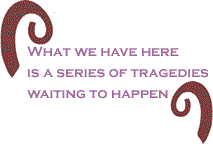|
Is
there any hope for the unemployed? Apparently not. Many,
says Chrystia Freeland, global editor-in-chief of Reuters
news, are people �on the wrong side of history.� The comment
came last Saturday during one of CNN�s innocuous chats about
the state of the economy where people of note sit around
and try to spell out what has gone wrong. Freeland, 32,
a Harvard graduate and Rhodes Scholar, was explaining how
the stubborn joblessness in the U.S. wasn�t necessarily
the result of the recession but is rather �structural,�
that is, the result of those looking for work and not finding
it lacking the requisite skills for today�s economy. Her
fellow panelists seemed to agree, one of them, Lakshman
Achuthan, managing director of Economic Cycle Research Institute,
saying that most of the jobs being wiped out daily �will
not come back.� Then, the moderator read the words of some
Republican politician putting responsibility for the jobs
crisis on President Obama saying, �I smell the coming of
midterm elections.� They all giggled.

Frankly,
I couldn�t find anything funny about it. The actions of
those in Congress that have held up the extension of benefits
to the long-term unemployed are not only politically reactionary
but also morally repugnant. It�s easy to understand their
continued assault on the concept of empathy; they don�t
have any and don�t think anyone else should. And, as far
as working women and men being on the �wrong� side of history,
well that depends on who�s making it. The fellow who said
the jobs are not coming back failed to say where they went.
It�s
all so cynical and so much hogwash.
Yes,
some of the unemployed would have a better shot at finding
work if they had great technical training, and yes there
are vacancies in some skilled positions. But there are skilled
workers in the ranks of the jobless. I recently ran across
the words of one a 42-year old Army veteran who used his
GI Bill to get a Computer Science degree. After 12 years
of working as a programmer, he told About.com, he
was laid off. He said that for a year he had submitted resumes
and been interviewed seven times but �sadly there are too
many programmers who are also out of work, there are always
more than 60 other computer programmers applying for the
same job.�
�The
unemployment benefits are a saving my life. I am also a
diabetic. Without these benefits my diabetes and health
would be out of control,� he concluded.
 Last
week, the New York Times ran a story on its business
page suggesting African Americans are more upbeat about
the state of the economy than others. It seems 53 percent
of the black people polled by the Pew Research Center
say they believe the economy is improving as opposed to
40 percent of whites. The report found the number �seemingly
counterintuitive� but the writer, Floyd Norris, quickly
came to the right conclusion as to why: wishful thinking.
For the first time there�s a black man in the White House
and we want him to succeed. It�s a hope against hope. But
that doesn�t make the numbers looks any better. Last
week, the New York Times ran a story on its business
page suggesting African Americans are more upbeat about
the state of the economy than others. It seems 53 percent
of the black people polled by the Pew Research Center
say they believe the economy is improving as opposed to
40 percent of whites. The report found the number �seemingly
counterintuitive� but the writer, Floyd Norris, quickly
came to the right conclusion as to why: wishful thinking.
For the first time there�s a black man in the White House
and we want him to succeed. It�s a hope against hope. But
that doesn�t make the numbers looks any better.
�While
nearly all Americans have suffered, blacks and Hispanics
have borne a disproportionate share of both job losses and
housing foreclosures,� says the Wall Street Journal.
Surveying
the jobless statistics for June, economist Dean Baker of
the Center for Economic and Policy Research observed, �The
employment-to-population (EPOP) ratio fell to 58.5 percent,
reversing gains from the prior three months; although this
is still 0.3 percentage points above the low hit in December.
This decline was concentrated among men who saw their EPOP
fall by 0.3 percentage points, as their unemployment rate
edged up from 9.8 to 9.9 percent. The EPOP for women was
unchanged, with their unemployment rate falling from 8.1
percent to 7.8 percent.
�Black
men were hit especially hard as their EPOP fell from 58.5
to 57.3 percent.
The
EPOP for black teens fell by 1.8 percentage points to 14.4
percent, just above the all-time lows hit in November and
December,� said Baker.
Another
recent research finding the major media didn�t report on
was spelled out June 30 by Sheree Crute and published June
30 on The
Root (http://tinyurl.com/32craxm).  It
was called �The Recession�s Long-Term Impact on Black Kids,�
and said, �Our children may be most vulnerable to damage
from the economic downturn.� It
was called �The Recession�s Long-Term Impact on Black Kids,�
and said, �Our children may be most vulnerable to damage
from the economic downturn.�
�As
adults wrestle with rising foreclosure rates and disappearing
jobs, child-development experts are reporting that children
may end up shouldering some of the most severe, long-lasting
consequences of the recession of 2008, according to the
Foundation for Child Development (FCD),� wrote Crute. The
foundation looked at seven key areas to see how the nation�s
children are doing amid the recession and what it means
for their futures. �The results show that kids from preschool
to age 19 may have to fight the detrimental impact of America�s financial
crisis for much of their lives. African-American kids will
be �harder hit than their white counterparts because a larger
proportion of children of color live in poverty.�
The
Composite Child Well-Being Index reveals that �virtually
all of the progress made in family economic well-being since
1975 will be wiped out for many,� as individuals, organizations
and governments trim budgets. Kenneth C. Land, a professor
of sociology and demography at Duke, who conducted the research
and wrote the CWI report, explained, �In order to measure
the full impact of the recession, we looked at trend data
from 1975 to 2008, then projected what may happen through
2012.� The survey numbers revealed a host of challenges
for children in middle- and lower-income families, �but
in each category, the risks would be 1.5 percent to 2 percent
higher for African-American children,� he says.
�This
situation will be particularly hard on African-American
children because they were already disproportionately affected
by poverty before the recession began,� said Alvin Poussaint,
M.D., an expert on children�s mental health and a professor
at Harvard, after reviewing the CWI at The Root�s
request. �What we have here is a series of tragedies waiting
to happen.�

Crute
writes, �One other deeply disturbing trend highlighted in
the CWI is the increasing alienation of young people who
see no clear path to economic advancement. African-American
kids - who, the CWI reports, will experience an unemployment
rate near 40 percent - are particularly vulnerable. �It
starts with the cuts we are seeing in pre-kindergarten programs
around the country and extends to adolescents,� Land says.
�We are picking up increases in detached youth, teens who
are not enrolled in school or employed. Without these social
bonds, we may see upticks in violence and risky behaviors.�
Crute
goes on to talk about the possible ways to ameliorate the
effects of the economic crisis on African American youngsters,
including the potential role of the church, mentoring programs
and family and community connectedness.
Of
course, nothing would help more than their parents having
jobs.
Being
unable to collect further unemployment benefits after being
out of work for a long time is going to make life a whole
lot rougher for the jobless workers and their kids.
Some
have attributed the Right�s unconcern for the plight of
the unemployed to ideology, a sort of tea party notion that
a government that actually steps in to aid the victims of
the economic crisis is too big. Another explanation is that
it all flows from the cynical decision of the Republican
Party of �no� to oppose anything proposed by the Obama White
House, and possibly a motive of hoping for the worse economic
conditions by the time of the November elections.  A
third, and quite plausible, suggestion has been made by
AFL-CIO President Richard Trumka, who said the other day,
�In a treacherous economy, our leaders should share the
goal of creating sustainable, broadly shared prosperity.
Instead, it seems congressional Republicans are determined
to create a desperate workforce, willing to take any jobs
at any pay rate under any circumstances. It�s a dream come
true for corporations that have pushed for 30 years to turn
America�s middle
class into a demoralized, low-wage and submissive workforce.� A
third, and quite plausible, suggestion has been made by
AFL-CIO President Richard Trumka, who said the other day,
�In a treacherous economy, our leaders should share the
goal of creating sustainable, broadly shared prosperity.
Instead, it seems congressional Republicans are determined
to create a desperate workforce, willing to take any jobs
at any pay rate under any circumstances. It�s a dream come
true for corporations that have pushed for 30 years to turn
America�s middle
class into a demoralized, low-wage and submissive workforce.�
Trumka
went on. �How any member of Congress can head home for this
July 4th recess and talk about the November election without
having voted for jobs and extended unemployment aid is beyond
me.�
Which
returns us to Freeland and company and this �structural�
unemployment and to the jobs that �will never come back.�
�Wall
Street has a plan and a new logic that is quietly infiltrating
the media and policy circles,� wrote Less Leopold on the
Huffington Post last week. �It�s called �structural
reform.� Although it is likely to involve some additional
pain and suffering, it�s being sold as the new magic bullet
for our ailing economy.�
Leopold
continues, �Structural reform is Wall Street speak for reducing
what is often called the �social wage� for working people
in every way possible: increasing the retirement age and
cutting Social Security benefits, government employment
and benefits, funds for public education, defined benefit
pensions, and health care expenditures....and of course,
extended unemployment benefits as well. (The Senate�s refusal,
yet again, to extend unemployment for 1.3 million laid-off
workers comes straight from the �structural reform� playbook.)
 �Allegedly,
the net result of these �reforms� is to reduce public debt
while making the labor market more �supple� so that employment
and wages can rise and fall quickly in response to shifting
supply and demand. This �freer� labor market reduces the
employer�s cost of hiring workers, which is supposed to
trigger a major jump in private sector employment.� �Allegedly,
the net result of these �reforms� is to reduce public debt
while making the labor market more �supple� so that employment
and wages can rise and fall quickly in response to shifting
supply and demand. This �freer� labor market reduces the
employer�s cost of hiring workers, which is supposed to
trigger a major jump in private sector employment.�
�In
truth, �structural reforms� doesn�t even touch the heart
of the crisis - tragically, they�ll only make it worse.
The real heart of the problem is too much wealth in the
hands of the few and too much power and wealth controlled
by Wall Street,� concludes Leopold, the author of The
Looting of America: How Wall Street's Game of Fantasy Finance
Destroyed Our Jobs, Pensions, and Prosperity-and What We
Can Do About It. (Chelsea Green Publishing, June 2009).
�There
is little basis for a hope of an improvement based on the
establishment data,� says Economic Policy Institute economist
Heidi Shierholz. �With state and local governments cutting
back to deal with deficits, house prices falling again,
and wages not keeping pace with inflation, there is little
hope for a robust growth any time soon. It is likely that
the unemployment rate will rise in the second half of the
year,� she continues, �With a 9.5% unemployment rate and
the private sector not yet able to provide a robust recovery,
Congressional inaction in passing policies that support
economic growth, including renewing the extended jobless
benefits in the Recovery Act and providing fiscal relief
to states, is inexcusable.�
BlackCommentator.com Editorial Board member
Carl Bloice is a writer in San Francisco, a member of the National Coordinating Committee
of the Committees of Correspondence for Democracy and Socialism
and formerly worked for a healthcare union. Click here
to contact Mr. Bloice.

|

